|
|
Chapter One: The Early Years
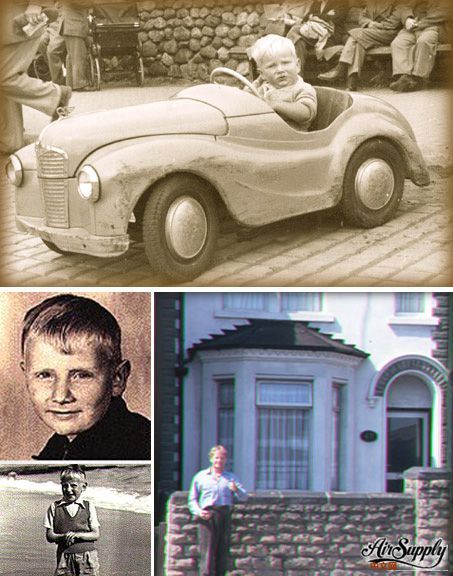
Graham's Childhood Home - Arnold, England
Graham Russell was born on June 11, 1950 in the English industrial city of Nottingham. His father was a factory supervisor. A good job at the factory was considered a success in the north of England at that time, but the Russell’s were by no means wealthy. Graham attended High Street primary school and discovered at a young age that he was extremely shy. This made it difficult to express his feelings verbally. The one place that Graham felt most comfortable was the legendary Sherwood Forest, which was a stone’s throw away from his house. Graham often walked alone in the forest and spent hours reading books from authors such as Charles Dickens and D.H. Lawrence. It was also in this forest that Graham began writing poetry.
At age ten, Graham experienced a life changing event. “I had a traumatic experience,” he said. “My mother died. She had cancer, but I thought she had the flu or something. It had a profound effect on me. I didn’t speak to anybody for three months because I was in shock. I didn’t go to school and I couldn’t speak. I had a writing pad around my neck and I used to write things down. If my uncles and aunts would say hello, I’d write ‘hello’ down on the pad. Then I got so used to it that I started to make rhymes of it. It started to be this rough poetry. When I learned to play the guitar around this time, I started to make little tunes to go with the rhymes.”
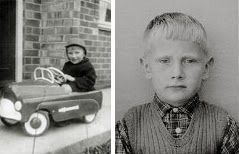
Graham wrote his first song when he was just twelve, and to learn guitar, he relied on the generosity of a neighbor. “I’d been to a dance and met a girl,” he said. “We danced all night, and I walked her home. After that, I couldn’t get her out of my mind. As I was walking home, I got a tune in my head and began humming it and adding words, so I wrote it down when I got home. It was called ‘Because I Love You So.’ A friend of mine at school named Ray Wood used to live across the road from me. He had a guitar and when I saw it I knew I had to play it. So when he handed it to me I accepted it upside down since I am left handed. I then learned my chords upside down and backyards. I should have re-strung it I suppose, but it gave me the ability to play a lot of chords that people can’t play.”
Graham was a self-taught musician, learning to play guitar, piano and drums by experimenting. His family was not necessarily considered musical but they did own a piano. “I taught myself to play drums,” he said. “The couch was my drum kit along with cardboard boxes and an authentic Ringo snare drum that was real plastic.The music I was exposed to at a very early age was the 50s stuff like Sinatra and Doris Day. We had a very small house but in the front room, which we were never allowed to go in because it was nice and tidy for company, we had an upright piano. I would sneak in there and play notes on the piano. Apart from that, there were no other musical entities in our house, besides a record player.”
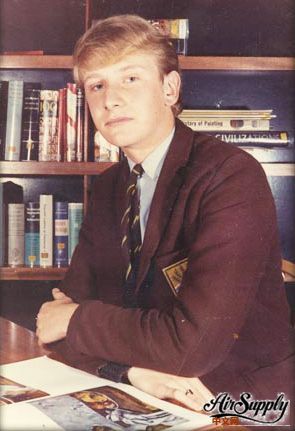
Graham the student
Graham’s father eventually re-married and wanted to start a new life in Australia. It was assumed that Graham would join his family on this adventure, but he had other plans. He had just settled into his new school, Carlton Le Willows Technical School, and was quickly making new friends. “At school I was the only boy in my English Lit class, so I was treated very special by the other thirty girls,” said Graham. On the evening before the Russell family was to depart on a ship to Melbourne, Graham made a desperate decision. “At the last minute I ran away from home and went to my girlfriends house,” he said. “We were going to leave the next morning. I was just fourteen years old, and I never saw my dad again until I went to Australia five years after that. But that was fine with me. I wanted to be on my own and do my own thing. I went to live with my mother’s brother.”
It was during this period, while living at his uncle’s house, that Graham became infatuated with the music of the Beatles. Like many other kids, Graham dreamed of one day playing in a band and becoming famous. “I remember rushing home from school in 1963,” said Graham, “taking off my school uniform and listening to Pop Goes The Beatles, a radio show on the BBC. It really changed my life. I would go into the cellar at my house, but it was not really the cellar. It was the dungeon the Beatles played in. Light shone in through a tiny hole and it was like a stage. I could see my reflection on the wall, and I told myself that I’ve got to join a music group.”
In 1964, Graham’s dream to play in a band was realized when he was asked to play drums for a local rock band called the Nottingham Odd Fellas. They changed their name to Union Blues and got very popular in the Midlands. They played support act for such bands as Moody Blues and Small Faces in Nottingham, and were on the verge of a major breakthrough. But Graham felt most comfortable playing guitar and singing his own songs, and the band refused to play his music, as they preferred blues or early Clapton and John Mayall. So Graham quit the band. He continued writing songs on his own, and often enjoyed singing with his friend Tony Brough after a few pints at The White Horse pub. “Tony and I would sit for hours singing my new songs and eating all his mother’s cookies with mugs of tea,” said Graham. “Tony always said, ‘You are going to make it,’ and I believed him. I was writing five, six songs a week from the time I was twelve. I’d go to school but I would sit and write lyrics in class. I literally got thrown out of school when I was seventeen because they couldn’t do anything with me.”
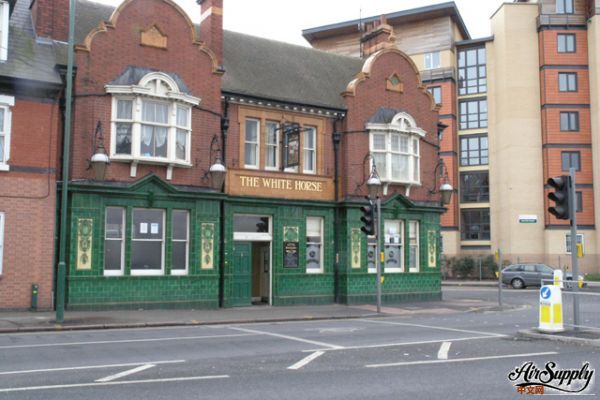
The White Horse Pub
Graham married his high school sweetheart, Lynda, in 1967. He was just seventeen at the time. Their first child, Simon, was born on March 17, 1968. “I got a very early start on life,” said Graham. “I have always been a very independent person, and have always looked after myself. I had a job when I was just eleven, working in a supermarket stocking shelves. So it was no surprise at seventeen when I wanted to get married. So my life was set in front on me.”
It was four years since Graham’s family moved to Australia, and they often asked when he might consider joining them. “My father was there, and my sister with her family, and they kept saying, ‘Why don’t you come here and start fresh, and do what you really want to do,’” recalls Graham. After finishing high school Graham moved to Melbourne. He packed up his new family and travelled by boat, because they could not afford to fly. It was a relief to be reunited with his father and sister, and he liked Australia at first sight. “No gray skies, just beaches and fun,” said Graham. “Australians are more positive than the English; they’re outdoor people.” He found work as a sheet metal worker, a bread delivery man, and as a Scotties tissue packer, which involved loading large rolls of tissue onto a trolley before they were sorted into individual boxes. “Imagine a four-foot-in-diameter toilet roll weighing four hundred pounds,” said Graham. “I’d load a multi-colored assortment of these rolls into a giant machine, then each roll would go around and stream into tissue boxes.” Graham also got a job as a ditch digger but quit after just one day.
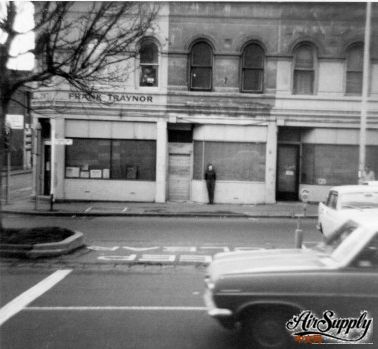
Frank Traynor Folk Club - Melbourne
Graham joined a local Melbourne band called M.P.D., which included Rob Mackenzie on guitar and Tim Partridge on bass. Graham played drums, but practiced guitar at home. M.P.D. found plenty of work, but Graham was surprised to find that the Melbourne music scene was much like England’s; his new band played mostly blues and covers, very much like his former band. Graham preferred to be up front playing guitar and singing his own songs, so he quit M.P.D. and went solo. “[M.P.D.] played old blues songs and it wasn’t really my thing,” said Graham. “I just loved the big harmonies and simple songs that made you feel good. Playing round and round on twelve-bar blues was not for me. So I just gave drums up. I woke up one morning and sold them. I said, ‘I’ve had enough drums,’ and went back to guitar.”
Graham began performing on his own as a singer/songwriter, playing his own material with the occasional cover, in small pizza parlors and on the Melbourne campus circuit. He was his own manager, booking shows and doing the occasional TV spot. He did this for two years, and he built up quite a following. “I used to hustle for dates, but I had three regular shows in pizza parlors. I’m not sure if they are still around but one was Poppas Pizza. I would perform on Tuesday, Thursday and Saturday and would make around $20 and get free pizza, which was great. I also used to play in this famous club in Melbourne called Traynors, and all the folkie people would go there. I used to love playing there because they had great guitar pickers. There was a guy named Graham Lowndes, and we became great friends. They were really first class. I was never a great guitar player or a great singer, but my package included my own songs. I would get about $5 a night because it was just a small coffee bar.”
On March 3, 1972, Graham and Linda welcomed their second child, Samantha, into their family. They enjoyed their suburban life, and Graham found that he was making a decent living playing his music. He performed small shows in Melbourne and Sydney over the next three years, but was beginning to think he would never make it big in the music business.
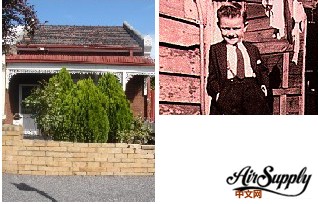
Russell's Childhood Home
Russell Hitchcock was born June 15, 1949, in Melbourne, Australia. Russell’s parents, Malcolm and Bettine, were both working class and managed several boarding houses around Melbourne. This meant that Russell and his older sister, Gail, lived in several houses throughout their childhood, mostly near the industrial part of town. One house was on a block with a brick-works on one side of the street and an iron foundry on the other.
The Hitchcock’s never owned a car because money was always tight. Malcolm also worked as a milkman, using a horse-drawn wagon to deliver the milk, and as a furnace operator in a laboratory. Bettine worked as a cook in a pub. “I lived in Melbourne in an area that was pretty industrial,” remembers Russell. “We never had much money so our entertainment was playing out in the street with the neighbourhood kids. There were about sixty of us, and we used to cause quite a ruckus! Because of the job my dad had we moved around quit a bit. By the time of my teen years, my sister and my parents ended up in one room in this boarding house, and the other room was the kitchen and dining room. As part of the deal, they got free rent if they managed the house. It was pretty hard going for a while for my folks. When your a kid you don’t realize if it’s good for you or bad for you. It’s just as it is because that’s your life. We always had food on the table, and were cleaned and dressed. We were respectful of everyone we met.”
Russell looks back on his childhood fondly. Until he was twelve, a skin disorder kept him swathed in bandages. “I had to wear gloves to bed!” he exclaims. “I was a happy kid though.” While walking to South Brunswick School at age seven, Russell was hit by a truck. “I was walking to school crossing an intersection, and not paying attention,” he said. “This guy in a pickup comes around the corner and creamed me. I had one of those over-the-shoulder leather school bags, and it came up between my head and the road, which is probably all that stopped me from being seriously injured. My mother said that I was never right in the head after that.” While attending secondary school, Russell enjoyed playing baseball and honing his bowling skills. He played every position on the baseball diamond except shortstop, and is proud to have earned a high school letter for his contributions to the team. He jokes that this is one of his life’s greatest achievements.
There was always plenty of music in the Hitchcock house. Malcolm was an amateur singer who enjoyed listening to Tony Bennett and Frank Sinatra records. “My dad sang with big bands when he was a young man and my sister sang in Melbourne on a semi-professional basis, so music was always in the house,” recalls Russell. “I was interested in music at a very early age. I used to entertain my parent’s friends by tapping out complicated rhythms on an upturned saucer, for very small monetary reward.” Russell was drawn to singers with smooth sounds and delivery. He remembers when his sister got a job and could afford to buy a new record player - mostly because she used to beat him up when he played her records.
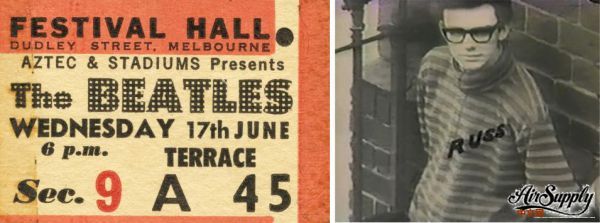
During his teenage years, everything changed for Russell after he first heard the Beatles. “One of my friends in school, David Poon, handed me a Beatles single,” said Russell. “I played this song and it blew my mind. After that I bought every magazine with the Beatles that I could find, and every record. Unfortunately, I didn’t have the hair to imitate their hair cuts because my hair was starting to get curly. But I wanted Beatles boots, Beatles jackets, everything I could get a hold of that was related to them.”
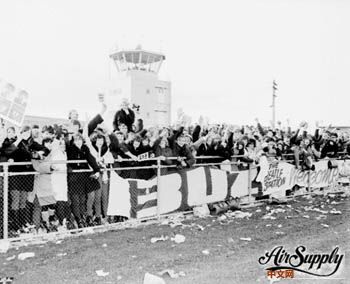
On June 15, 1964, the Beatles were in Melbourne celebrating their reunion with Ringo Star, who had missed the early part of their world tour after being struck down by acute tonsillitis and pharyngitis. That night, and for the two subsequent nights, the Beatles performed two shows to a rowdy Melbourne crowd. Russell Hitchcock was one of 45,000 people who watched the concerts. “It was my fifteenth birthday,” said Russell, “and my cousin got us tickets to to see the Beatles live at a place called Festival Hall in Melbourne, which was basically just a barn. In those days, none of the instruments had microphones on them and they used these columns with four six inch speakers on either side of the stage for the vocals, so you really only got to hear anything every couple minutes because the crowd noise was deafening. But I was there and can say that I saw them. I became quit snobby in my musical tastes after hearing them because in that period, you were either a Rolling Stones fan or a Beatles fan. But you couldn’t be both. One of them were the boys next door and the other guys were supposed to be degenerates. I always liked people with good voices, and I always liked harmonies. I was blown away with the Beatles, the Eagles, the Bee Gees and Little River Band. When I was in my teens in Melbourne, I used to sneak into clubs and it was just amazing to see Billy Thorpe and the Purple Hearts.”
One of Russell’s earliest ambitions was to become an actor. He appeared briefly in a 1965 short film called Gift From A Stranger. The black and white eight-minute film was directed by Russell’s high school friend Chris Lofven, and starred David Poon, Helen Bermic and Frank Thring. Lofven went on to become a successful underground film director in Australia, for a time specializing in promotional music videos.
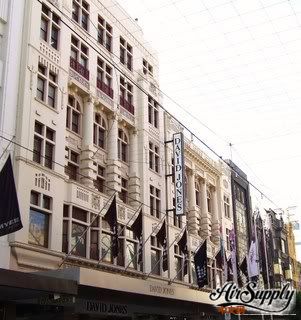
Buckley & Nunn Department Store
At age sixteen, Russell dropped out of Princes Hill High School. “I tried unsuccessfully at school and we did not get along too great,” said Russell. “I think I was a good student, but I didn’t want to do homework. I wanted to get out and play. So, during my fifth year of high school I said that was enough for me. I was wasting my time and my parents money. I failed the State exams, and I was devastated. I got a job a couple days after I got my results. Not just to support myself, but to try and help my parents out. My sister and I both realized that if you want to get anywhere you have to work for it.”
Russell took a job selling suits in a small men’s wear shop in Melbourne, but was forced to leave when the store was sold and shut down. He found work at a large department store in Melbourne called Buckley & Nunn (Purchased by David Jones in 1982) where he sold suitcases and other travel accessories.

“The first job I had was in a clothing store, a very small one owned by an elderly gentleman,” recalls Russell. “There were only four or five people working in the store. I did that for about six months. Then the guy who owned the store, his son passed away, so he sold the business and found everyone in the store a new job [at Buckley & Nunn]. I did that for four or five years and I sold a lot of suitcases. I then got a job offer for this computer company called ICL, which was an English company with offices in Melbourne and Sydney. I just gave out spare parts because in those days hardware was hardware. Card punch machines. So I did this in Melbourne for three or four years and then they transferred me to Sydney to manage the spare parts division in 1973.”
Russell had no formal music training as a youth but he taught himself to play drums. He was also a naturally gifted singer with a soaring tenor voice and a three and a half octave range. He started playing in bands at age fifteen, eventually playing local universities with a band called 19th Generation. They were a rock and roll band that played the classic Johnny B. Goode style of material. Russell’s role in the band was drummer and lead vocalist, which he was quick to point out “isn’t the easiest thing in the world to be. I don’t know that I sang much, but I played drums with a friend from high school named Chris Lofven. I think he bought a bass because he wanted to be Paul McCartney or something. He knew that I had some kind of rhythm because my sister and dad had bought me a very basic drum kit for my birthday. Chris and I started to play with two other guys, and we did cover songs. We really didn’t do that much. We got a gig here and there on weekends.” When Chris Lofven left 19th Generation, Russell played part time in a band made up of Melbourne University students.
In 1969, twenty-year-old Russell decided to settle down and get married. They had a child on April 27, 1971, a boy named Jon. With the responsibility of marriage, a child and a full time job, Russell abandoned his music career. He stopped playing music because he couldn’t get anything together and didn’t like the trends at the time. “Up until I got into the music business, I was very conscious about security,” said Russell. “I wore a three-piece suit and I was really into the nine-to-five thing. I’d always wanted to get into music, but I didn’t because I thought you were supposed to have a menial job with a wife and two kids. I knew there was something missing in my life, but I didn’t know what it was.” |
|
 匿名
发表于 2011-12-6 21:29
匿名
发表于 2011-12-6 21:29
 匿名
发表于 2011-12-6 21:29
匿名
发表于 2011-12-6 21:29